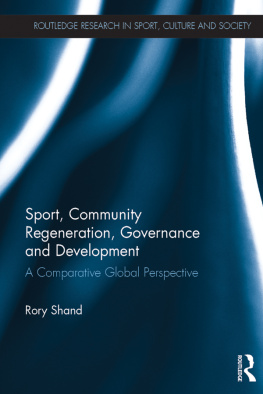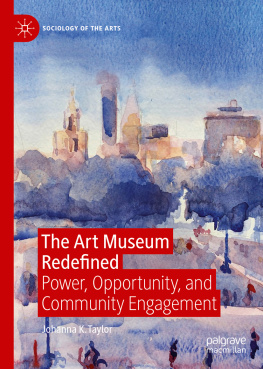Narratives of Neglect
CRIME ETHNOGRAPHY SERIES
Series editors: Dick Hobbs and Geoffrey Pearson
Published titles
Holding Your Square: streetlife, masculinities and violence, by Christopher W. Mullins
Narratives of Neglect: Community, regeneration and the governance of security, by Jacqui Karn
Narratives of Neglect
Community, regeneration and the
governance of security
Jacqui Karn
First published 2007 by Willan Publishing
Published 2014 by Routledge
2 Park Square, Milton Park, Abingdon, Oxon OX14 4RN
711 Third Avenue, New York, NY, 10017, USA
Routledge is an imprint of the Taylor & Francis Group, an informa business
Copyright 2007 Jacqui Karn
The right of Jacqui Karn to be identified as the author of this book has been asserted by her in accordance with the Copyright, Designs and Patents Act of 1988.
No part of this book may be reprinted or reproduced or utilised in any form or by any electronic, mechanical, or other means, now known or hereafter invented, including photocopying and recording, or in any information storage or retrieval system, without permission in writing from the publishers.
Notices
Knowledge and best practice in this field are constantly changing. As new research and experience broaden our understanding, changes in research methods, professional practices, or medical treatment may become necessary.
Practitioners and researchers must always rely on their own experience and knowledge in evaluating and using any information, methods, compounds, or experiments described herein. In using such information or methods they should be mindful of their own safety and the safety of others, including parties for whom they have a professional responsibility.
To the fullest extent of the law, neither the Publisher nor the authors, contributors, or editors, assume any liability for any injury and/or damage to persons or property as a matter of products liability, negligence or otherwise, or from any use or operation of any methods, products, instructions, or ideas contained in the material herein.
British Library Cataloguing in Publication Data
A catalogue record for this book is available from the British Library
ISBN 13: 9781843921950 (hbk)
Typeset by GCS, Leighton Buzzard, Bedfordshire
To the memory of my mother.
For the stories she told.
Contents
Acknowledgements
My thanks go firstly to the residents of the estates in which I conducted this research for their warm welcome, time and frank advice. Though in order to preserve confidentiality I cannot name the area or the individuals, I would, in particular, like to thank those I have called Pat, James, Henry, Deb and Rob. Likewise my thanks go to the professional staff working there, who again I cannot name, who gave me their time, interest and put up with my presence at meetings. Special thanks are due to the staff at the youth centre who allowed me to hang around for weeks. Thanks also to Peter Chi Man Chan for translation and to Nicola Moran for help in emergencies.
My special gratitude goes to Ian Loader and Evi Girling for their enthusiasm, advice and occasional thick skins. My thanks also go to all in the Criminology Department at Keele University and those at the Mannheim Centre for Criminology, the London School of Economics, for comments and support. I am also grateful to Richard Sparks and Adam Crawford for tactful but challenging criticism and timely encouragement to publish. Further thanks to Tim Newburn and Dick Hobbs for guidance during the editing process. I also want to thank the Economic and Social Research Council for financial support during the course of the PhD (R00429934240) and for funding me as a Postdoctoral Fellow (PTA-026-27-057) which gave me the space to edit this for publication.
I also owe a huge debt of gratitude to Evangeline, Bill and Katharine for unwavering friendship, love and support. Similarly to Ceri, Andy, Meg, Jo, Sal, Sarah and Lisa for providing light relief. Thanks also to Deborah and Julia for carrying on their friendship to the next generation.
Jacqui Karn
Part I
Introducing an Ethnography
Chapter 1
Introducing the estate
Throughout the book I will be exploring the ways in which both residents and professionals went about making sense of the changes that had already occurred, and those that were continuing to take place, on a small, multiple-deprived council estate on the edge of Manchester city centre. The estate having declined in appearance, reputation and population, the city had secured approval for its demolition and rebuilding in conjunction with private developers. In contrast to its stigmatised present, it was hoped that this future would be a model of sustainable city centre living. As well as a record of the responses to these changes, this book is in part an attempt to build a locally sensitive sociology of sensibilities about crime that reflect the local experience of wider (global) social changes (Girling et al. 2000: 12; Taylor et al. 1996). I hope to explore the ways in which crime figures as a problem amongst others within wider understandings of the trajectories of the estate and its place (and that of its residents) in the world.
In particular I will draw attention to the relationship between the constitution of problems, responses to change and relationships with authorities and residents sense of social position. I will explore the ways in which these relationships with authorities impact on residents sense of insecurity and are influenced by their understandings of social inequality. This emphasis on relationships between residents and authorities, and their respective understandings of local problems, structures the book. The title, Narratives of Neglect, refers to this central strand running through the book, of the ways in which residents and professionals understood the decline of the area and its apparent neglect by those variously seen to be responsible for its maintenance and control. An exploration of these narratives amongst residents and professionals provides the context for discussion of the capacity for communities to influence regeneration and the local governance of security through participation processes.
I will explore the concepts, questions and policy context that form the background to this research in and the estate on which I focus and of what was entailed in undertaking the ethnography there.
Millton and the estate
Millton is a small area on the borders of Manchester city centre, but its poverty stands in marked contrast to the growing prosperity of the city centre's renaissance. It is divided almost in half by a canal. On one side of this the estate is made up of low-rise late-1970s council housing in a circular but confusing layout. On the other side of the canal stand the crumbling historic warehouses of Manchester's industrial revolution. Once the most densely populated area of Manchester (Kidd and Wyke 1993), this area is now largely abandoned, but crowned with World Heritage status, and slowly being revamped to provide loft-style living accommodation. The area has been dubbed an urban village and its history rewritten as an Italian enclave, while the mundane and abandoned estate stands as its antithesis.








